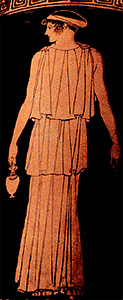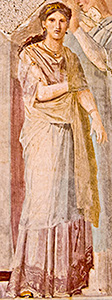
Athenian woman wearing peplos, red-figure vase


Modern scholars studying ancient women frequently compare and contrast the appearance, behavior, and social, economic, and legal status of Roman and Greek women, especially the women of classical Athens. These cultural differences were apparent to at least some ancient Romans as well, and a writer such as Cornelius Nepos exploited them for his own purposes. Nepos (c. 100-c. 25 BCE) was a prolific Roman writer of wide-ranging encyclopedic projects, most notably biographies of illustrious men, a small part of which are still extant. He grouped his subjects into professional categories (generals, kings, historians, etc.) in two books, the first including foreigners and the second, Romans. In this way he was able to set forth as exempla the qualities and achievements of eminent men and to emphasize comparisons between Roman cultural traditions and customs and those of other countries, especially the Greeks. Nepos was advocating a kind of cultural relativism, emphasizing that his readers needed to understand the cultural traditions of the men who were his subjects in order to avoid making biased judgments based solely on the readers' own cultural standards. To support this argument, Nepos included a preface setting forth a number of examples of customs and behaviors that were perfectly acceptable in Greece or Rome but considered base or scandalous in the other nation. Significantly, though Nepos's biographical subjects were all men, most of these examples involved women. For Nepos, discussing customs relating to women was an ideal way to contrast cultural traditions because both Greeks and Romans typically thought of women as a generic category rather than as individuals, and because both cultures associated women with sexuality and therefore with standards of honor and disgrace. The passage below includes one example relating to marriage, another pertaining to women's participation in social events such as dinner parties, and a third contrasting domestic arrangements within the house, arguing that Roman women had free access to all parts of the domus, even mingling with clients during the morning visit (salutatio), while Greek houses were divided into male quarters (andron) and female quarters (the gynaeceum), in which women spent most of their time.
(2)Sed hi erunt fere qui, expertes litterarum Graecarum nihil rectum nisi quod ipsorum moribus conveniat, putabunt.
(3)Hi, si didicerint non eadem omnibus esse honesta atque turpia sed omnia maiorum institutis iudicari, non admirabuntur nos in Graiorum virtutibus exponendis mores eorum secutos.
(4)Neque
enim
Cimoni fuit
![]() turpe,
Atheniensium
summo viro, sororem
germanam
habere in matrimonio,
quippe
cum
cives eius eodem
uterentur
instituto.
At id
quidem nostris moribus
nefas
habetur. . . .
turpe,
Atheniensium
summo viro, sororem
germanam
habere in matrimonio,
quippe
cum
cives eius eodem
uterentur
instituto.
At id
quidem nostris moribus
nefas
habetur. . . .
(6)Contra ea,
pleraque
nostris moribus sunt
decora quae
apud illos
turpia putantur.
Quem
enim
Romanorum
pudet
uxorem
ducere in
convivium?
Aut cuius non mater familias primum
locum
tenet
aedium
atque in celebritate
versatur?
![]()
(7)
Quod
multo
fit
aliter in
Graecia. Nam neque in convivium
adhibetur
nisi propinquorum,
neque
sedet nisi in
interiore parte
aedium,
quae gynaeconitis
appellatur;
![]() quo
nemo
accedit nisi propinqua
cognatione
coniunctus.
quo
nemo
accedit nisi propinqua
cognatione
coniunctus.
Click on the underlined words for translation aids and commentary, which will appear in a small window. Click on the icon link![]() to the right of the text for related images and information.
to the right of the text for related images and information.